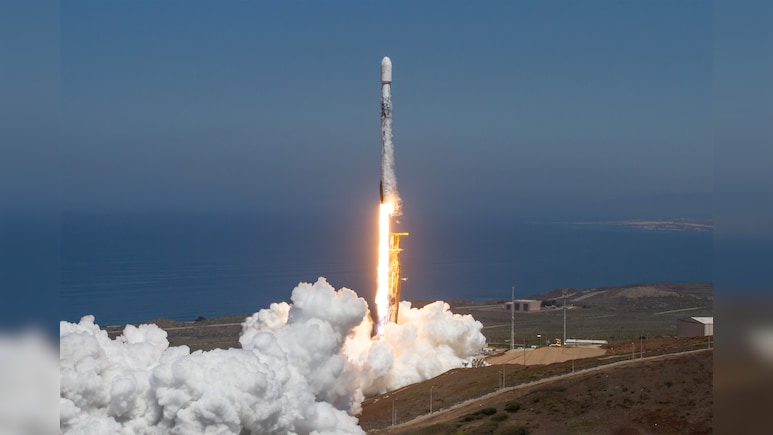
In a landmark moment for India's burgeoning private space ecosystem, two home grown startups - Pixxel and Dhruva Space - successfully launched satellites aboard SpaceX's Falcon 9 rocket as part of the National Advanced Optical System (NAOS) mission from Vandenberg Space Force Base in California.
The dual deployment not only highlights India's commercial prowess in space technology but also marks a strategic win in beating the tariff deadline for international launches. It should be noted that in June, India's astronaut Group Captain Shubhanshu Shukla also launched into space on a Falcon-9 rocket.
Pixxel's Fireflies: Largest Private Earth Imaging Constellation
Pixxel, the Bengaluru-based hyperspectral imaging company, launched three new Firefly satellites, completing the first phase of its commercial constellation. With six Fireflies now in orbit, Pixxel has established the largest Indian private-sector Earth imaging satellite constellation in the world.
Each Firefly satellite is equipped with cutting-edge hyperspectral sensors capable of capturing imagery in 135+ spectral bands at five-meter resolution across a 40-kilometre swath. This enables unprecedented insights into environmental, agricultural and industrial phenomena - from detecting crop stress and pest infestations to identifying gas leaks and monitoring climate-driven changes.
"Our earlier launches showed what was possible, this one shows what's next. Expanding to six Fireflies will transform hyperspectral imaging from isolated snapshots into a continuous planetary memory. With six Fireflies in orbit, the planet itself becomes a living laboratory. What was once invisible is now measurable, and what is measurable can finally be changed, for a better world for all to come," Pixxel founder and CEO Awais Ahmed said.
The Fireflies operate in a Sun-synchronous Low Earth Orbit, at an altitude of 550 kilometers, enabling daily revisit capability for any location on Earth. This configuration allows Pixxel to deliver high-frequency, high-fidelity data to scientists, governments, and industries worldwide.
"With six Fireflies in orbit, we can monitor the planet with a fidelity never before seen in commercial space. We are closer than ever to making hyperspectral intelligence accessible to all those working to solve humanity's toughest challenges," Mr Ahmed said.
Pixxel's roadmap includes the launch of its next-generation Honeybee satellites, which will extend into the Short-Wave Infrared (SWIR) bands and offer faster revisit times. These satellites will work in tandem with the Fireflies to create a persistent, planet-wide health monitoring system.
Dhruva Space's LEAP-1: A Leap Toward Global Payload Hosting
Sharing the Falcon 9 ride was Hyderabad-based Dhruva Space, which launched its LEAP-1 satellite, a hosted payload mission that builds on the company's successful qualification of the onboard ISRO's Polar Satellite Launch Vehicle mission number PSLV-C58.
Earlier, Dhruva Space CEO and co-founder Sanjay Nekkanti said: "We are confident this multilateral, collaborative approach will drive innovation, bring down costs, and invest in commercial capabilities to grow the business opportunities that can serve other customers and further foster a global Space economy."
LEAP-1 marks Dhruva Space's transition from capability-building to delivering impactful customer missions. The company is now scaling up its commercial payload hosting operations, enabling transformative possibilities in global space applications.
Mr Nekkanti explained the significance of an Indo-Australian collaboration: "Teaming up with our commercial partners in Australia creates remarkable opportunities for Indo-Australian Space business, which will, in turn, foster a long-term partnership. India is already a key economic and regional partner and we see this mission symbolic of India's status as a fast-growing Space program."
India's Private Space Sector: A Force to Reckon With
The joint success of Pixxel and Dhruva Space on a single rocket underscores the robustness and maturity of India's private space ecosystem. It also reflects a strategic alignment with global partners like SpaceX, enabling Indian startups to scale rapidly and compete internationally.
This launch is particularly notable for its timing - beating the tariff deadline, a move that demonstrates agility and commercial acumen.
Pixxel's achievement is a "Made in India for the world" story, showcasing how Indian innovation is shaping the future of Earth observation. Meanwhile, Dhruva Space's LEAP-1 mission validates India's capability to deliver hosted payloads with global relevance.
As Mr Ahmed aptly put it: "This launch is where our vision begins operating at scale. With every new satellite, Pixxel moves closer to a future where the health of our planet can be monitored continuously, with speed, precision, and actionable intelligence at global scale."
A New Era for Indian Space Startups
With six Fireflies in orbit and LEAP-1 successfully deployed, India's private space sector has taken a giant leap forward. These missions not only demonstrate technological excellence but also signal a shift in global perception - India is no longer just a launch destination, it is a creator of cutting-edge space solutions.
One rocket. Two startups. One powerful message: India's private space sector is ready for lift off.
Track Latest News Live on NDTV.com and get news updates from India and around the world

